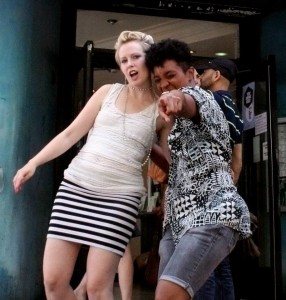Portrayals of Gang Youth Violence: Two Short Films at the Rio Cinema, London

Left to right: The directors Eva-Marie Elg and Dionne Edwards, outside the Rio Cinema in Hackney, London.
One of London’s last independent cinemas, the Rio in Dalston, hosted shorts by two visionary women filmmakers at a private screening on Sunday 21 July.
The two directors portrayed gang life in the city through different approaches. Dionne Edwards, 27, from Bristol, who moved to London when she was 18, took the fiction route. Eva-Marie Elg, 30, who came to London in 2003 from just outside the industrial town of Borlänge in Sweden, took the documentary route.
Edward’s film Got Got, shot in colour with a running time of just under 13 minutes, was self and crowd funded. The setting is a dystopian London, where a government agency and two gangs attack each other over a box, known as the ‘box of everything’, although it is never quite revealed what is inside. Yet it seems that the desires and needs of the box are worth dying and killing for. The violence to obtain it escalates with an unleashing evil effect comparable to Pandora’s box.
This object with it’s unknown content as a central focus brings scenes from other films to mind. Like the glowing suitcase in Pulp Fiction, which causes death and destruction as different gangsters and individuals desperately try to obtain it, this is a wonderful keep-guessing-plot-piece for a film. In Pulp Fiction, rumours still abound today about the content of the suitcase. Then there is the cube in Hell Raiser, which evokes pure demonic obsession and torment to whoever possesses it.
The two gangs in Got Got each have their own identity. On the one side we have the mad, eccentric Clockwork Orangesque psychos with their snarling laughs evoking a pack of hyenas. Their suave, grey-haired leader Norman Scragg, played by Gareth Kearns, uses his cricket bat to smack people’s heads off. On the other side two men and a woman wearing hoodies and yellow bandanas covering their faces make up the Swift Bandits.
Edwards recalled how she and the co-cinematographer, Roman Koblov, came up with prerequisites for an action film at the time when “the Olympic games were happening close by.” Although inspired by this real event, her writing of the script “became increasingly bizarre.” Following a pattern since Edwards last short film Linda’s Date, mixed emotional states, dreams and nightmares crop up again here. Teng Teng Productions, started by Edwards and three others, state on their website that the protagonist T-swift, played by Nasir Mohamed who worked on TV shows such as Holby City and Law and Order UK, is “a sprinter athlete, who is beset by visions.” He wakes up in different realities, always with the box in his grasp.
Edwards elaborated on this theme. She said: “Our dreams and nightmares contain all our fears, anxieties and desires and I think this really makes for interesting worlds to explore cinematically. I’m very interested in the human mind and how neurosis develops on an individual and collective level.”
She continued: “Linda’s Date, my last film, explored one character’s anxiety, which was very destructive on an internal level. Got Got is much more external. I’ve grown up around people with mental illnesses and mental conditions, so that’s probably where my fascination comes from on a subconscious level.”
Eva-Marie Elg’s film Mercury Fur Unveiled is a documentary on a youth project based on Phillip Ridley’s original play Mercury Fur. The play was first performed in 2005 amidst controversy due to the storyline of violence and drugs and the depiction of a breakdown of society.
The adaptation of the play is called Behind the Eyes and directed by Jessica Rae Drader. It is part of the Schema Art Collective based in Peckham. Drader approached Elg because she knew the composer she initially worked with to develop the project. Drader needed a company to sponsor the project to apply for funding and this is where Happy Endings Productions Ltd, Elg’s production company, got involved in 2009.
Happy Endings Productions Ltd started in 2006. In 2009, they produced a documentary called Suburban Madness, which takes place in one of the poorest suburbs of Rio de Janeiro. It follows doctors and patients at a mental institution as they get ready to participate in the annual carnival. There were initial problems involved in getting funding, “so we decided to use our own finances to fund this project and so far, it’s won several awards at international film festivals and has even screened at Amnesty International in London,” said Elg.
With Behind the Eyes, Happy Endings secured funding from Peckham Rye and Nunhead Community Council and LGBTQ Southwark. Elg said: “Jess [Jessica Rae Drader], who was also the project’s producer, and I spent 2010 securing the funding. We always knew we were going to do the project in Peckham, as this is where Jess lives and has connections to the local community.”
Behind the Eyes is beautifully shot on mini-DV to represent the down-to-earth community project. It starts with strong black and white shots “as the project flourishes into perfection, by increasingly including more and more colour as the story evolves.” What is also different in the documentary is the absence of a voiceover, as Elg wanted the audience to experience the project without distractions that a third-person voice might cause.
The 30 minute documentary follows the day-to-day workings, trials and tribulations of young actors from the Peckham community. We watch them learn to develop the roles of desperately drug-addicted gang members who thrive on violence and madness in a dystopian world.
What does the future hold for these two talented self-made filmmakers? Edwards wants to get more coverage for Got Got and will continue to make short films with Teng Teng Productions. Elg has returned to Sweden to study Film Activism. As these two young filmmakers push ahead doing things their own way, the world is their oyster.
























